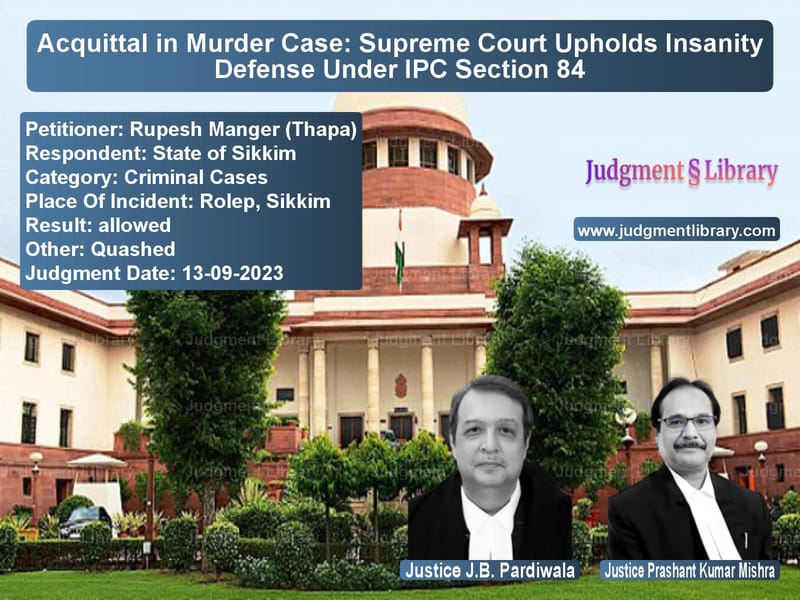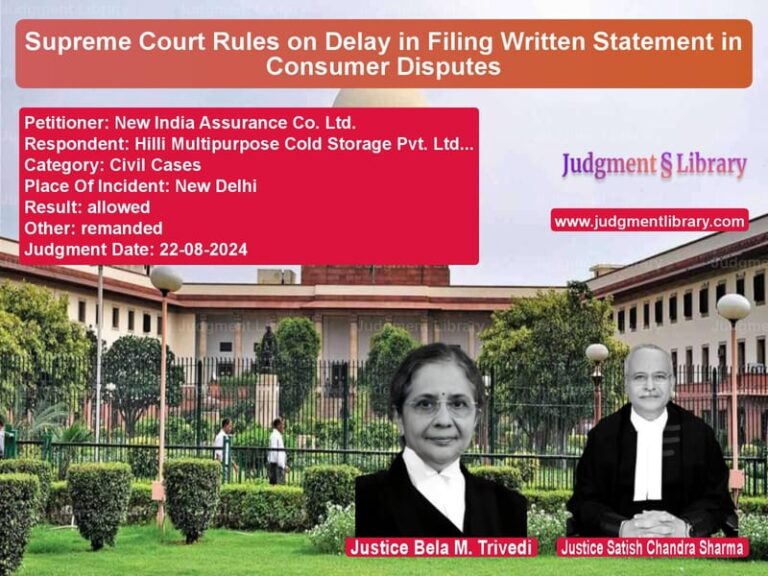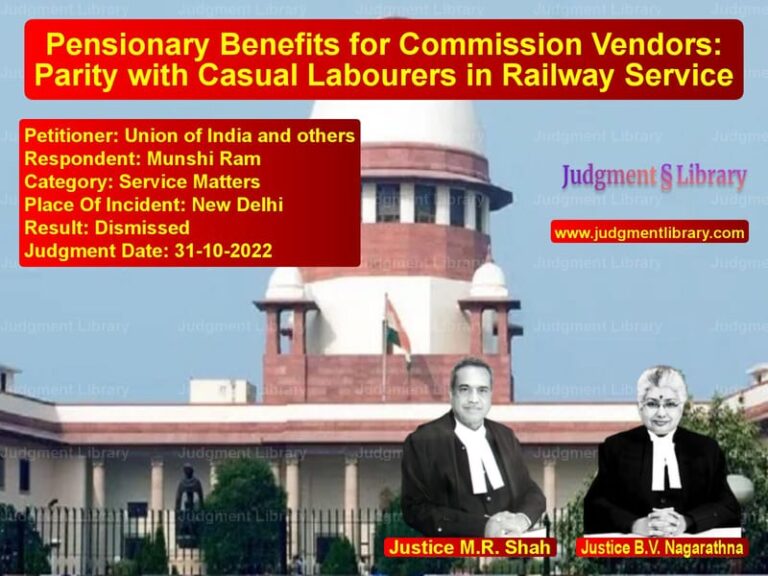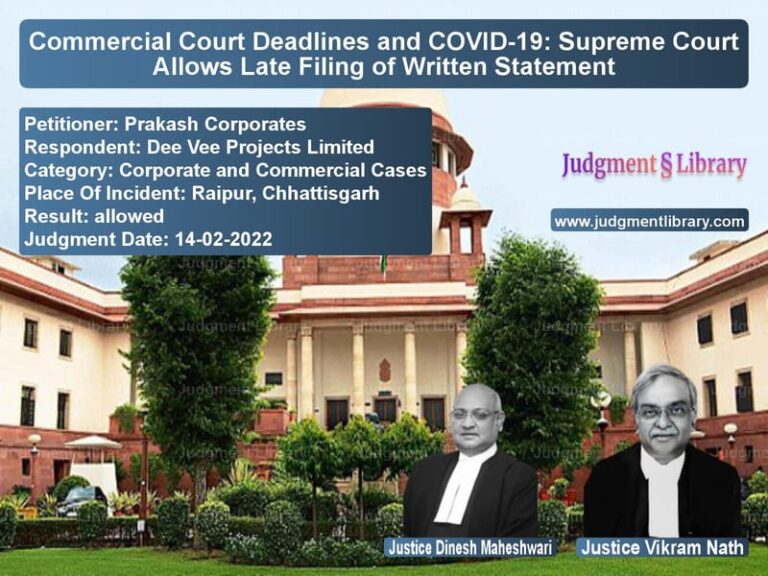Acquittal in Murder Case: Supreme Court Upholds Insanity Defense Under IPC Section 84
The Supreme Court of India recently delivered a significant judgment in the case of Rupesh Manger (Thapa) vs. State of Sikkim, dealing with the legal defense of insanity under Section 84 of the Indian Penal Code (IPC). The case revolved around the conviction of the appellant for the murder of his grandfather, which was initially overturned by the trial court on the grounds of insanity but later reinstated by the High Court. The Supreme Court, in this judgment, upheld the trial court’s decision, emphasizing that the benefit of insanity must be granted where a reasonable doubt exists about the accused’s mental condition at the time of the crime.
Background of the Case
The case pertained to the murder of an 81-year-old man, Krishna Bahadur Rai, by his grandson, Rupesh Manger. The incident took place in Rolep, Sikkim, where the deceased was residing with his daughter (PW-1) and the accused. According to the prosecution, the accused used a sharp-edged weapon to kill his grandfather and was later found trying to pull out the windpipe of the deceased. The trial court acquitted the accused, citing his mental illness as a valid defense under Section 84 IPC. However, the High Court reversed the acquittal and sentenced him to life imprisonment under Section 302 IPC.
The Supreme Court, upon appeal, had to decide whether the accused’s mental condition at the time of the offense entitled him to the benefit of Section 84 IPC.
Legal Issues Considered
- Whether the High Court could reverse the acquittal by the trial court without proving perversity in its findings.
- Whether the accused’s mental illness was sufficient to invoke Section 84 IPC and absolve him of criminal liability.
- Whether there was sufficient evidence to suggest that the accused, at the time of the offense, was incapable of understanding the nature of his actions.
Petitioner’s Arguments
The appellant, represented by senior counsel, contended that:
- The trial court’s decision was based on strong medical evidence confirming the accused’s history of psychiatric illness, including treatment for acute and transient psychotic disorder.
- As per established legal principles, an acquittal should not be reversed merely because an alternative view is possible. The High Court had no valid ground to disturb the trial court’s findings.
- The accused had a well-documented history of mental illness, as evidenced by the testimony of his mother (DW-1) and medical experts.
- At the time of the incident, the accused displayed irrational behavior, including attempting to remove the windpipe of the deceased.
Respondent’s Arguments
The prosecution, represented by the State of Sikkim, countered these claims, arguing that:
- The accused was aware of his actions and had deliberately attacked the deceased, as per the testimonies of eyewitnesses PW-1 and PW-13.
- The High Court had correctly assessed the evidence and found that the accused was not legally insane at the time of the crime.
- Merely having a history of mental illness does not automatically qualify an accused for exemption under Section 84 IPC.
- The trial court erred in extending the benefit of insanity without conclusive proof that the accused was incapable of understanding his actions.
Supreme Court’s Analysis
The Supreme Court examined the principles governing the defense of insanity under Section 84 IPC, which states:
“Nothing is an offense which is done by a person who, at the time of doing it, by reason of unsoundness of mind, is incapable of knowing the nature of the act, or that he is doing what is either wrong or contrary to law.”
The Court reiterated that legal insanity differs from medical insanity, emphasizing that the accused must be unable to comprehend his actions at the time of the crime.
The Supreme Court also referred to the following landmark judgments:
- Dahyabhai Chhaganbhai Thakker vs. State of Gujarat (1964): Established that the burden of proving insanity lies with the accused but only to the extent of creating reasonable doubt.
- Surendra Mishra vs. State of Jharkhand (2011): Differentiated between medical and legal insanity, ruling that only the latter could exonerate an accused.
- Devidas Loka Rathod vs. State of Maharashtra (2018): Held that past and present conduct must be examined to determine legal insanity.
The Supreme Court found that the trial court had correctly applied these principles. The medical records confirmed that the accused had a history of psychotic disorders and was on medication. Witness testimony indicated erratic behavior before and after the incident, supporting the plea of insanity.
Final Judgment
The Supreme Court set aside the High Court’s judgment and restored the trial court’s acquittal order. It ruled that:
- The High Court erred in reversing the acquittal without proving that the trial court’s findings were perverse.
- The accused’s history of psychiatric illness, coupled with his abnormal behavior during and after the offense, justified invoking Section 84 IPC.
- The principle of reasonable doubt applied, and since the accused’s mental state raised sufficient doubt, he was entitled to acquittal.
The Court ordered the immediate release of the accused, stating:
“We, accordingly, set aside the judgment impugned dated 24.08.2022 and the order dated 05.09.2022 passed by the High Court and affirm the judgment of acquittal dated 30.10.2018 passed by the Trial Court. We, accordingly, allow the appeals and acquit the appellant-accused of the charge under Section 302 IPC. The appellant shall be set at liberty forthwith, if not required in any other case.”
Implications of the Judgment
- Strengthens the legal framework for the insanity defense, ensuring fair trials for mentally ill accused persons.
- Reaffirms that appellate courts must prove perversity before reversing acquittals.
- Ensures that past psychiatric history and conduct at the time of the crime are critical in determining legal insanity.
- Safeguards the rights of mentally ill individuals within the criminal justice system.
Conclusion
This landmark judgment reinforces the necessity of upholding procedural fairness in criminal trials, particularly in cases involving mental illness. By applying the legal principles governing insanity defenses, the Supreme Court has provided clarity on how courts should approach such cases. The ruling serves as an important precedent in ensuring that individuals suffering from severe mental disorders are not wrongfully convicted due to misinterpretation of legal standards.
Petitioner Name: Rupesh Manger (Thapa).Respondent Name: State of Sikkim.Judgment By: Justice J.B. Pardiwala, Justice Prashant Kumar Mishra.Place Of Incident: Rolep, Sikkim.Judgment Date: 13-09-2023.
Don’t miss out on the full details! Download the complete judgment in PDF format below and gain valuable insights instantly!
Download Judgment: rupesh-manger-(thapa-vs-state-of-sikkim-supreme-court-of-india-judgment-dated-13-09-2023.pdf
Directly Download Judgment: Directly download this Judgment
See all petitions in Murder Cases
See all petitions in Judgment by J.B. Pardiwala
See all petitions in Judgment by Prashant Kumar Mishra
See all petitions in allowed
See all petitions in Quashed
See all petitions in supreme court of India judgments September 2023
See all petitions in 2023 judgments
See all posts in Criminal Cases Category
See all allowed petitions in Criminal Cases Category
See all Dismissed petitions in Criminal Cases Category
See all partially allowed petitions in Criminal Cases Category







